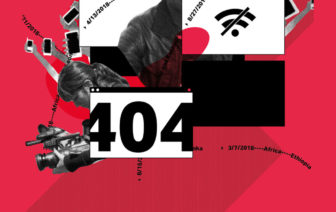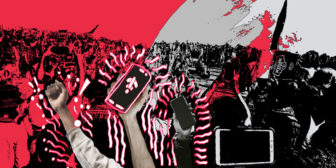
2025 ELECTIONS AND INTERNET SHUTDOWNS WATCH
Around the world, governments use internet shutdowns to interfere with election outcomes and damage participatory democracy. This is a practice that harms human rights — we cannot allow it to become normalized.
Since 2016, the global #KeepItOn coalition — a network of over 345 civil society organizations — has mobilized people and communities to monitor, document, and resist internet shutdowns. In recent years, a stark reality has become undeniably clear: more and more governments are choosing to shut down the internet and restrict access to digital platforms before, during, and after elections.
As part of the #KeepItOn coalition’s fight to end all internet shutdowns, we work to raise awareness of the dangers of election-related shutdowns, by engaging with and building capacity among government officials, the private sector, election observers, foreign and diplomatic missions, journalists, and human rights defenders. Our advocacy has led to the governments of DRC, Sierra Leone, Nigeria, Bangladesh, Kenya, and Ghana making public commitments to #KeepItOn during elections, and we have garnered support from the likes of the Freedom Online Coalition and the African Commission on Human and People’s Rights (ACHPR), which have denounced election-related shutdowns and urged states to refrain from normalizing the practice. We urge others to join our fight.
Cutting connectivity around elections is a recipe for disrupting democracy. It not only shows a complete disregard for human rights, it denies people access to critical information ahead of and during voting, undermines their ability to actively participate in the electoral process, and casts doubt on the credibility and transparency of election results. Election-related internet shutdowns empower incumbent regimes to control information flows and silence opposing voices and narratives. Governments have used internet shutdowns to cover up their violent, sometimes fatal, crackdowns on anyone protesting the organization or outcomes of elections, especially those believed to be rigged.
During 2024’s “ultimate election year,” in which more than one billion people went to the polls, we monitored elections in at least 25 countries that had previously shut down the internet or seemed likely to do so, given their political situation. Unfortunately, seven of these — Azerbaijan, Comoros, India, Mauritania, Mozambique, Pakistan, and Venezuela — did indeed shut down the internet around their respective elections, marking a resurgence in the number of election-related shutdowns, which had been steadily declining since 2019.
The #KeepItOn coalition is committed to keeping watch around key elections during 2025 and beyond, and to engaging with relevant government actors and stakeholders to end election-related internet shutdowns for good.
WATCHLIST
While 2025 sees significantly fewer elections than last year, the stakes are still high for people heading to the polls amid political turmoil — including active or recent conflict, rampant political violence, and high levels of insecurity. As part of our efforts advocating for open, inclusive, and secure internet access for all, before, during, and after elections, the 2025 #KeepItOn Election Watch list features 12 countries, all of which have a history of imposing shutdowns during events of national importance such as protests or elections, and where the overall political, economic, or human rights situation suggests that this could recur.
Important note: Throughout the year, we may add additional countries to this list if the threat of a shutdown increases or if dates are announced for high-risk elections that have been postponed. Please reach out to us if you are seeing indicators of election-related shutdown risk in a country not listed below or if you would like to collaborate with us to fight against election-related internet shutdowns.
Navigate the list below and click down for more details on each country:
Date
country
status
| Date | Country | Status |
|---|---|---|
| January 12 | Comoros | No shutdown detected |
| January 26 | Belarus | Shutdown detected |
| February 5 | India | No shutdown detected |
| March 2 | Tajikistan | No shutdown detected |
| April 12 | Gabon | TBD |
| May 25 | Suriname | TBD |
| June 5 | Burundi | TBD |
| September 14 | Russia | TBD |
| October TBD | Cameroon | TBD |
| October TBD | Tanzania | TBD |
| November 23 | Guinea Bissau | TBD |
| TBD | Niger | TBD |
| TBD | Venezuela | TBD |
You can also browse elections on the watch by region:
Elections on the watch list in Africa
COMOROS
January 12 — Parliamentary elections
What happened:
We received no reports of internet shutdowns during Comoros’ parliamentary elections.
Why we watched:
Authorities in Comoros imposed their first internet shutdown in 2024, in response to protests that erupted after incumbent President Azali Assoumani was declared the winner of the presidential elections. Data from Cloudflare Radar and IODA confirmed the shutdown, beginning at 09:00 UTC on January 17, 2024, and impacting the country’s main internet service provider, Comores Telecom. We commend the government of Comoros for not making the same mistake this year.
gabon
April 12 — General election
Why we’re watching:
The Ali Bongo-led government imposed internet shutdowns during key elections in both 2023 and 2016, resulting in him being declared winner of both elections — despite public outcry by the opposition and the people of Gabon. In 2023, authorities shut down the internet as polls closed on August 26, with access restored on August 30, following a military coup which annulled the election results and deposed the Ali Bongo administration. As Gabon returns to civilian rule, we call on authorities to ensure that people have access to open, inclusive and secure internet and digital platforms at all times in the country.
burundi
June 5 — Parliamentary elections
Why we’re watching:
During Burundi’s most recent presidential elections in May 2020, President Pierre Nkurunziza’s government blocked countrywide access to Facebook, Twitter (now X), WhatsApp, and YouTube, in an attempt to curtail freedom of speech and impede people’s access to key information about the elections. Given the current government’s track record of restricting freedom of the press and expression, we call on them to ensure unhindered access to the internet and digital platforms throughout June’s parliamentary elections.
tanzania
October TBC — General election
Why we’re watching:
Ahead of the last general elections of October 2020, the government of Tanzania imposed its first internet shutdown — even as people were relying on the internet to access life-saving information amid the COVID-19 pandemic. On the eve of the elections, access to WhatsApp, Twitter (now X), and Telegram was suspended, with authorities ordering telecom service providers to suspend access to short messaging services (SMS) and voice services, leaving millions of Tanzanians without any way to communicate. As the country prepares for general elections in October, we urge the government of Tanzania to refrain from restricting access to open, inclusive, and secure internet and digital platforms.
cameroon
October TBD — Presidential election
Why we’re watching:
Cameroonian authorities have previously imposed internet shutdowns during moments of national importance. In January 2017, the Cameroonian government shut down access to the internet in the country’s Anglophone regions, to squash protests against systemic political, linguistic, and economic discrimination. Following the high-profile #BringBackOurInternet campaign and condemnation from the UN, human rights groups, and high-profile figures like Edward Snowden, internet access was restored after 94 days — only for authorities to once again disrupt access to Facebook, Twitter (now X), Instagram, and WhatsApp for over four months starting in October of the same year.
Ahead of pivotal presidential elections later this year, we wish to work with stakeholders in Cameroon to prevent any related shutdowns, and we urge the government to publicly commit to safeguarding internet access before, during, and after the elections.
GUINEA-BISSAU
November 23 — General election
Why we’re watching:
In July 2024, authorities in Guinea-Bissau disrupted access to the internet and digital platforms for the first time ever, as part of a wider attempt to quell planned anti-government demonstrations across the country. Local groups accused the government of imposing the shutdown to prevent information about ongoing kidnappings in the country from being disseminated.
We urge the authorities of Guinea-Bissau to end the use of shutdowns in moments of national crisis and to #KeepItOn throughout the country’s elections in November.
niger
TBD — General election
Why we’re watching:
Following the contested, and protested, outcome of a presidential election run-off in February 2021, the government of Niger forced all major internet service providers (ISPs) to shut down mobile internet connection across the country.
With the first democratic election since July 2023’s military coup scheduled to take place in 2025, we appeal to authorities to ensure that people of Niger have unfettered access to connectivity to actively participate in this transition period.
Elections on the watch list in Asia-Pacific
india
Delhi: February 5; Bihar: November TBD — Legislative elections
What happened: We received no reports of internet shutdowns during Delhi’s legislative elections.
Why we watched:
Year after year, India ranks as a leading perpetrator of shutdowns. In 2023, India was responsible for 116 out of 283 shutdowns recorded worldwide. While elections have traditionally been less of a trigger for shutdowns, compared with protests, for instance, 2024’s general election saw authorities in the Bihar Saran district disrupt internet services, while authorities in Jammu and Kashmir banned the use of VPNs for a whole month leading up to the general election, and during local elections held the same year.
With legislative elections scheduled in Delhi for February, and in Bihar state later this year, we will be closely monitoring the situation, while engaging with Indian authorities to reverse their dangerous pattern of resorting to internet shutdowns in moments of crisis.
Elections on the watch list in Eastern Europe & Central Asia
belarus
January 26 — Presidential election
What happened:
We received reports of internet shutdowns during Belarus’ presidential election.
Why we watched:
In August 2020, protests broke out across Belarus, following elections that saw the country’s self-proclaimed president, Alexandr Lukashenko, who has been in power for more than three decades, return to power for another five years. Ignoring calls for new, free, and fair elections to be held and for an end to the persecution of dissenting voices, the government ordered ISPs operating in the country to shut down the internet completely, blocking access to the social media platforms and foreign news platforms where people could access information on the elections and the human rights situation in Belarus.
President Lukashenko has threatened to repeat this action should similar protests recur around the January 2025 elections — a move intended to intimidate Belarusians into accepting the elections’ outcome. In an environment where journalists, human rights defenders, and opposition leaders are constantly facing attacks and repression, we urged the international community to support our call for authorities to #KeepItOn for all, throughout the elections in Belarus.
tajikistan
March 2 — Parliamentary election
What happened: We received no reports of internet shutdowns during Tajikistan’s parliamentary elections.
Why we watched:
In recent years, Tajik authorities have imposed shutdowns, coupled with other censorship tactics, to silence critics and to respond to protests and other political events, further widening the digital divide in a country where the high cost of internet access, poor quality, and low penetration are already a barrier for many. In November 2021, the Tajikistan authorities cut off internet access in the autonomous region of Gorno-Badakhshan (GBAO) for about four months, in response to protests over the Tajik security agents’ killing of Gulbiddin Ziyobekov, a member of the Pamiri ethnic minority, in the capital, Khorog. Barely a month after internet access was restored, authorities again severed connectivity, following the resurgence of protests in the country.
RUSSIA
September 14 — Local election
Why we’re watching:
Russia has a long record of shutting down the internet to silence dissent, control information flows, and shape narratives, inside and beyond its borders. Around elections, authorities have imposed internet blackouts to muzzle opposition politicians, and have used them during conflict to cover up human rights violations and atrocities. During Russia’s 2021 parliamentary elections, we documented the incumbent government’s imposition of shutdowns and acts of censorship. The government has also deliberately disconnected people in order to test its sovereign internet initiative, has blocked Facebook, X, Instagram, and YouTube in order to enforce its digital dictatorship, and has intensified its crackdown on the use of VPNs used to circumvent network restrictions. With the complicity of tech companies such as Apple, which has bowed to pressure to remove certain VPN apps from its App Store in the country, approximately 197 VPNs are now blocked in Russia.
Ahead of this year’s local election, we call on Russian authorities to ensure unfettered access to the internet and digital platforms before, during, and after the elections.
Elections on the watch list in Latin America and the Caribbean
suriname
May 25 — General election
Why we’re watching:
In February 2023, authorities responded to mass protests against economic reforms in the capital of Paramaribo and calls for resignation of the president and vice president, by imposing a 12-hour curfew and blocking access to social media platforms countrywide. This was the first instance of Surinamese authorities disrupting access to digital communication platforms. Following recent reforms to the electoral system and the promise of socio-economic development for the people of Suriname, we urge authorities to ensure the electoral process is free and transparent, and to #KeepItOn throughout.
venezuela
TBD — Legislative election
Why we’re watching:
In January 2025, during the inauguration of the current Maduro administration, authorities in Venezuela began blocking access to digital platforms including TikTok and Telegram, and to the websites of at least 21 VPN and circumvention services. This follows a number of shutdowns imposed in the country last year, most notably during the 2024 presidential elections, when authorities blocked access to Signal, X, Microsoft Teams, and Reddit, in response to post-election protests.
Amid Venezuela’s ongoing economic instability, allegations of human rights abuses, and a power struggle between the government and opposition forces, the Maduro government has repeatedly resorted to internet shutdowns to suppress opposition voices and limit the flow of information within the country. Ahead of this year’s legislative elections, we denounce the ongoing shutdowns in Venezuela, and call on the Maduro administration to lift all platform bans and refrain from imposing any future blocks.
WHAT YOU CAN DO ABOUT ELECTION-RELATED SHUTDOWNS
Fighting internet shutdowns requires collaboration, solidarity, awareness-raising, and documentation of evidence. As part of Access Now and the #KeepItOn coalition’s 2025 Election Watch campaign, we hope to strengthen our advocacy against shutdowns to harness democratic values globally. We will empower people and communities through awareness-raising, capacity building, and training, as well as equipping them with tools and resources to fight back against shutdowns. We will continue engaging with governments, private companies, individuals, and stakeholders in countries with upcoming elections, until those authorities commit to upholding internet access as a prerequisite for free, fair, and transparent elections.
Given the internet and digital communications platforms’ role in advancing democracy, we urge all stakeholders — including civil society actors, journalists, human rights defenders, governments, companies, and individuals — to collaborate with the #KeepItOn coalition and join the global movement against shutdowns today.
Learn more about the #KeepItOn coalition and how you can support our fight against shutdowns.
CONNECT WITH US TO HELP FIGHT SHUTDOWNS IN YOUR COUNTRY
Stop election shutdowns in your country
If you would like to collaborate with us ahead of elections in your country this year, please reach out to #KeepItOn Campaign Manager Felicia Anthonio at felicia@accessnow.org. Learn more in the #KeepItOn election toolkit, also available in the following languages:
[English] | [Russian] | [French] | [Spanish] | [Arabic] | [Swahili]
Learn about and prepare for election shutdowns
Are you an election observer, activist, journalist, blogger, or someone else interested in the impact of shutdowns on democratic processes? Want to know how to prepare for disruptions? Read and share our internet shutdowns and election handbook. Refer to the #KeepItOn FAQs for more information about the campaign.
Help us document the harm of election shutdowns
Storytelling can be an extremely powerful advocacy tool. If you’ve experienced an internet shutdown, consider sharing your experience as part of Access Now’s Shutdown Impact Stories project. Use this form (available in several languages), and your story could help inform policy change, challenge shutdown orders in court, and raise awareness about the threats and harms of shutdowns globally.
Advocate against election shutdowns
We rely on a global network to help detect and fight internet shutdowns. You can use the #KeepItOn hashtag to flag shutdown threats and support coalition actions in each of the countries above.
LATEST ON ELECTIONS AND INTERNET SHUTDOWNS

Pakistan’s internet disrupted during virtual election rally

Regulator orders nonstop telecom services during election

#KeepItOn in Bangladesh: ensure open, free internet before, during, and after elections
Authorities in Bangladesh must guarantee unfettered access to the internet and all other digital communication channels through all phases of the election cycle.

#KeepItOn: Bangladeshi authorities must protect open and secure internet throughout the 2024 elections
Access Now and the #KeepItOn coalition are calling on Bangladeshi authorities in Banglades to ensure people across the country have full access to the internet, social media platforms, and communication channels before, during, and after upcoming parliamentary elections.

How to stay safe online during the 2024 Bangladesh election
The 2024 Bangladesh election takes place on 7 January. Against a backdrop of myriad threats to digital freedoms and human rights online, we’re created a guide to help journalists, activists, and voters stay safe during the election period.

#KeepItOn: DRC’s government must protect open and secure internet and social media platforms throughout the 2023 elections

#KeepItOn in DRC: internet is vital this election
